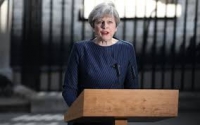
The next general election in the United Kingdom is proposed to take place on Thursday 8 June 2017.
To do achieve this it will require a motion to be passed by the Commons, which the Prime Minister will move on 19 April and which will be supported by the opposition parties including Labour and the Liberal Democrats.
It is scheduled to be held on or before Thursday 7 May 2020, in line with the Fixed-term Parliaments Act 2011; it may be held at an earlier date in the event of a motion of no confidence or a two-thirds supermajority of the House of Commons.
The Fixed-term Parliaments Act 2011 is an Act of the Parliament of the United Kingdom that introduced fixed-term elections to the Westminster parliament. Under the provisions of the Act, parliamentary elections must be held every five years, beginning in 2015. The Act received Royal Assent on 15 September 2011. Only in the case of a vote of no confidence or with a two-thirds majority of the Commons may an election be called any earlier.
Fixed-term Parliaments, where general elections ordinarily take place in accordance with a schedule set far in advance, were part of the Conservative–Liberal Democrat coalition agreement which was produced after the 2010 general election.
Before the passage of the Act, Parliament could be dissolved by royal proclamation by virtue of the Royal Prerogative. This originally meant that the British monarch decided when to dissolve Parliament. Over time, the monarch increasingly acted only on the advice of the prime minister; by the nineteenth century, prime ministers had a great deal of de facto control over the timings of general elections.
Today 18 April 2017, the Prime Minister Theresa May announced she will seek to hold an election on Thursday 8 June 2017.
Information courtesy Wikipedia
Leave a comment
Make sure you enter all the required information, indicated by an asterisk (*). HTML code is not allowed.
Join
FREE
Here










